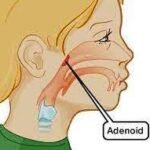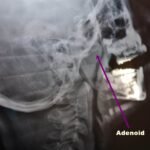
Author
Dr Neha Gupta [MS ENT (PGI,Chandigarh), DNB, FHNS], Consultant ENT & Head Neck Surgery
- Does your child breath through mouth while asleep?
- Does your child snore at night?
- Does your child have recurrent and relapsing cold and cough?
- Does your child complaining of recurrent ear pain?
- Do you feel that your child is having hearing problem?
These are the symptoms of enlargement of adenoid.
What is adenoid?
Adenoid is a lymphoid tissue situated in nasopharynx (space behind the nasal cavity). It functions as a part of immune system which helps in building immunity against infections exposed through nose.

Why adenoid grows?
The physiological growth (natural growth) of adenoid occurs rapidly during infancy and plateaus between 2-14 years of age and rapidly regresses in size after 15 years age. Physiological growth may cause mild symptoms with occasional mouth breathing and snoring, which subsides on it’s own (self-limiting).
Frequent infection of adenoid (recurrent adenoiditis) during childhood leads to excessive enlargement of adenoid, beyond physiological enlargement.
What are symptoms of adenoid hypertrophy?
Common symptoms of adenoid hypertrophy are mouth breathing, snoring, recurrent cold and cough, recurrent ear infection, sleep disturbance etc.
Untreated adenoid hypertrophy may lead to rhinitis (nasal obstruction, nasal discharge, sneezing), chronic sinusitis (sinus infection), middle ear infection (decreased hearing, ear discharge, perforation of ear drum), obstructive sleep apnoea in children.
How adenoid hypertrophy is treated?
As adenoid is located behind nose in a space called nasopharynx, it is not visible directly. We see adenoid by doing a nasal endoscopy (an endoscope is passed through nose). When child do not co-operate for this procedure, a X Ray of nasopharynx is done to visualize adenoid. According to increasing size of adenoid it is graded from Grade I to Grade IV.

Depending on severity of symptoms decision of treatment is made. Medical treatment includes decongestant, steroid nasal spray.
When severe symptoms present or when symptoms do not resolve with medical treatment, surgery (adenoidectomy) is performed. Many a times this procedure is combined with tonsillectomy depending on symptoms of tonsil infection.
Adenoidectomy, now-a-days, is done under direct visualization of endoscope and using latest equipment (Micro-debrider, Coablator etc). These methods minimizes, risk of intra-operative and post- operative bleeding.
Does surgery affects immunity of child?
Adenoid surgery does not affect immunity of child when done after age of 3-4 years. There are other lymphoid tissues in body which also contribute to development of immunity.
What are problems with untreated adenoid hypertrophy?
Untreated adenoid hypertrophy may lead to rhinitis (nasal obstruction, nasal discharge, sneezing), chronic sinusitis (sinus infection), middle ear infection (decreased hearing, ear discharge, perforation of ear drum), obstructive sleep apnoea in children.
Author can be reached by email- anvimedicalcenter@gmail.com

This post is extremely radiant. I really like this post. It is outstanding amongst other posts that I’ve read in quite a while. Much obliged for this better than average post. I truly value it!